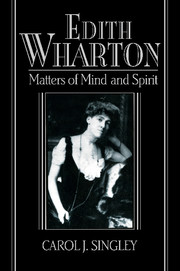Introduction
Published online by Cambridge University Press: 06 August 2010
Summary
No story teller … can do great work unbased on some philosophy of life.
Edith Wharton, “A Reconsideration of Proust”It is easy to overlook the religious and spiritual dimensions of Edith Wharton's life and fiction if we view her primarily as a novelist of manners. The label “aristocratic lady novelist” – a designation revealing the biases of gender and class – also discounts her intellectual seriousness. In fact, Wharton infuses even her most socially minded texts with religious, moral, or philosophical reflection. And although she resisted the more vociferous forms of feminist activism at the turn of the century, her voice is often clear and dissenting, calling for moral as well as social equality for women. Concerns for ideals and for women's place in structures that often exclude or marginalize them are consistent motifs in Wharton's life and writing.
Morals and Manners
Although Edith Wharton thought of herself as a novelist of manners, she might have chosen a different designation had she foreseen the limitations of the term. To understand this category of realism, I take Lionel Trilling's definition: a novelist of manners writes of society's conventions, including not only etiquette and decorum but principles, rules, and laws that are established by tacit assumption (“Manners” 200–1). However useful the label “novelist of manners” may be, it exerts a subtle bias, allowing critics to focus on the social features of a writer's portrayals at the expense of her deeper levels of insight into human nature.
- Type
- Chapter
- Information
- Edith WhartonMatters of Mind and Spirit, pp. 1 - 40Publisher: Cambridge University PressPrint publication year: 1995
- 1
- Cited by

